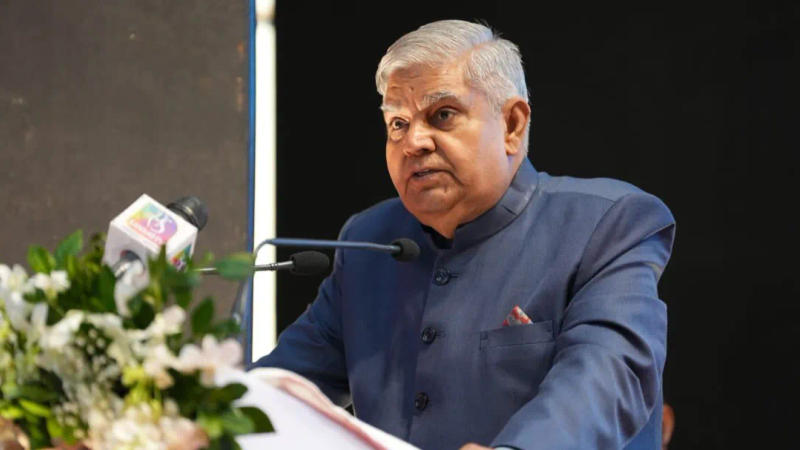Published 17:51 IST, October 18th 2024
'Being Too Tolerant': Dhankhar on Violence Against Hindus in India's Neighbourhood
Vice President Jagdeep Dhankhar called the Partition, the Emergency, and the 1984 anti-Sikh riots traumatic events that remind us of the fragility of freedom.

New Delhi: Vice President Jagdeep Dhankhar on Friday flagged human rights violations against Hindus in India's neighbourhood and questioned the global silence, saying being "too tolerant" against such transgressions was not appropriate.
Questioning the "deafening silence" of the "so-called moral preachers, custodians of human rights", he said they stand exposed.
"They are mercenaries of something which is totally antithetical to human rights," he said addressing the foundation day celebrations of the National Human Rights Commission.
He said we are "too tolerant" and being too tolerant to such transgressions is not appropriate.
Call for Reflection on Human Rights Violations
"Think if you were one of those," he said asking the people to reflect.
"Look at the kind of barbarity, torture, traumatised experience of boys, girls, and women," he said, adding look at our religious places being subjected to sacrilege.
However, he did not name any country.
Warning Against Pernicious Forces
The vice president also cautioned that some pernicious forces were trying to show India in a "bad colour" and called for a "counter-attack" to neutralise such attempts.
He also said that India does not like to be sermonised or lectured on human rights.
Historical Context of Human Rights in India
He described Partition, imposition of Emergency and the 1984 anti-Sikh riots as traumatising events which "stand as sombre reminder of fragility of liberty".
Dhankhar said there are "pernicious forces, that in a structured manner, seek to unfairly seek to taint us" and these forces have a "sinister design" to use international fora to question our human rights record.
Rebuttal to Criticisms of India's Human Rights Record
He said there was need to neutralise such forces and they should be neutralised "by actions which exemplify, if I may say in Indian context, 'pratighat' (counter-attack)".
The vice president said these forces have devised indexes and rank everyone in the world to show "our nation in bad colour".
He also hit out at the hunger index which ranked India poorly, saying during the Covid pandemic, the government supported over 80 crore people with free ration regardless of their caste and creed.
The vice president said the "sinister forces" are driven by an agenda which is "fiscally fuelled" by people who seek to make a name for themselves.
"Time to shame them. They try to create havoc with the economic system of the country".
Defense of Minority Rights in India
Underlining the safety of minorities in India, he said the country is way ahead of others when it comes to preserving human rights, particularly those of minorities, the marginalised and vulnerable sections of the society.
He also noted that at the domestic front, some were trying to use human rights to further their political agenda.
Caution Against Using Human Rights as a Foreign Policy Tool
In the course of his address, Dhankhar said, "Evidence in episode after episode" is piling up that the "deep state" is engaging in efforts against rising powers.
Human rights, Dhankhar underlined, cannot and should not be used as a tool of foreign policy to exert power and influence over others.
"Naming and shaming is a degraded form of diplomacy. You have to preach only what you practice," he said.
"Look at our school system- we don't have the kind of shootings that some countries claiming to be very developed have on a regular basis. Think of those nations that turn Nelson's eye to such horrendous transgressions of human rights," he said.
Political Agenda and Demographic Balance Concerns
Dhankhar was of the view that rights of other non-Hindu refugees are repeatedly invoked, "surprisingly, also in the name of human rights, when cases are filed in the Supreme Court." This, he asserted, exposes a political agenda aimed at disrupting the demographic balance of the country, which could have global repercussions.
History is testimony that nations have completely lost their identity by not addressing this issue. It has global repercussions from the perspective of human rights, he warned.
(With PTI inputs)
Updated 17:51 IST, October 18th 2024




